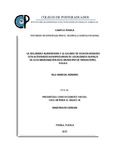La seguridad alimentaria y la calidad de vida en hogares con actividades agropecuarias de localidades rurales de alta marginación en el municipio de Yehualtepec, Puebla
Abstract
La preocupación por asegurar los alimentos a las personas despertó el interés de organismos internacionales; en México se han implementado programas con la finalidad de mejorar el acceso económico de los alimentos en el hogar sin embargo, cifras oficiales revelan que una cuarta parte de la población aún tiene problemas de acceso a los alimentos. El presente estudio tiene como objetivo conocer la calidad de vida y el grado de seguridad alimentaria de los hogares en cuatro localidades rurales de alta marginación y con actividades agropecuarias en Yehualtepec, Puebla. Se realizaron talleres participativos y se aplicó un cuestionario estructurado para obtener información cuali-cuantitativa a una muestra representativa de hogares. Se obtuvo la información entre febrero a junio de 2015. Se estimó la seguridad alimentaria con la Escala Mexicana de Seguridad Alimentaria. Se elaboró un índice sintético de calidad de vida a partir de análisis de componentes principales. Se plantea que un mayor grado de seguridad alimentaria determina la supervivencia en los hogares. En el 68% de los hogares existe inseguridad alimentaria, en el 18% de los hogares hay carencia al acceso a la alimentación. Las familias viven del ingreso no agropecuario seguido de los programas sociales e ingresos por la venta de ganado. En el 50% de los hogares el ingreso mensual individual está por debajo de la línea de bienestar mínima para el medio rural. Se observó sobrepeso y obesidad en jefe(a) de hogar. En el 40% de los hogares se presenta baja o muy baja calidad de vida. La calidad de vida está bien valorada por el jefe(a) de hogar con aspectos subjetivos. Se identificó relación entre la calidad de vida y el hacinamiento en el hogar y a mayor diversidad dietética mayor calidad de vida. _______________ FOOD SECURITY AND QUALITY OF LIFE IN HOUSEHOLDS WITH AGRICULTURAL ACTIVITIES IN RURAL LOCATIONS HIGHLY MARGINALIZED IN YEHUALTEPEC, PUEBLA. ABSTRACT: The concern to ensure food to people caught the attention of international organizations; Mexico has implemented programs with the aim of improving economic access to food at home but official figures show that a quarter of the population still do not have sufficient access to food. The aim of this study was determine the quality of life and the level of food security of households in four rural localities with high marginalization and agricultural activities in Yehualtepec, Puebla. Participatory workshops from February to June 2015 were organized and structured to obtain qualitative and quantitative information from a representative sample of households. The food security status was obtained using the Mexican Food Security Index. A synthetic index for quality of life was derived from principal component analysis. It was found that a greater degree of food security determines the survival of households. 68% of households lack food security, 18% of households do not have appropiate access to food. Families make a living from income of non-agricultural activities, social programs and from the sale of livestock. Near 50% of households the per capita monthly income is below the minimum welfare for rural areas. Overweight and obesity was observed in the head of the family. In 40% of households show a low or very low quality of life. Quality of life is well assessed by the head of households using subjective aspects. Relationships were identified between lower quality of life and overcrowding of the household and between greater dietary diversity whit higher quality of life.
Collections
- Tesis MC, MT, MP y DC [398]


